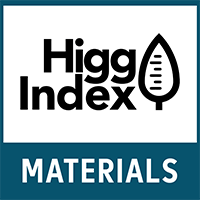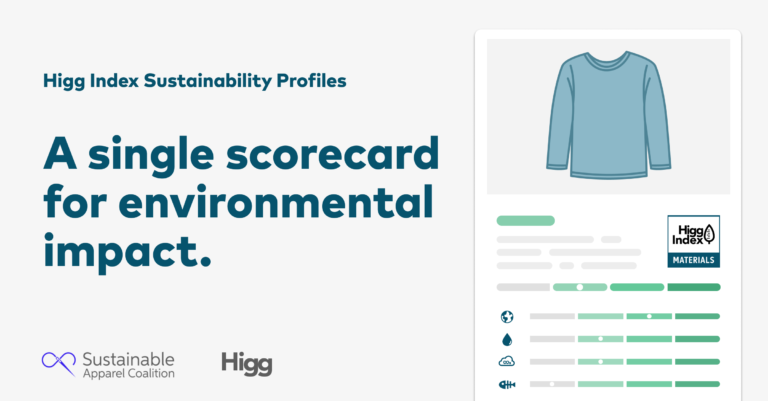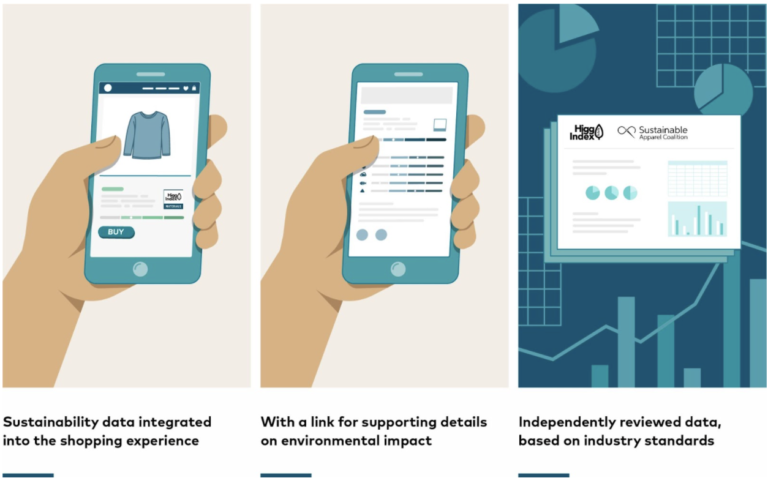
Higg and the Sustainable Apparel Coalition just launched an environmental transparency program for consumers, making it possible for everyone to shop sustainably. Starting with Amazon, H&M and Norrona, and using the universal, independently-verified Higg score cards, the dream of providing consumers with product environmental impact data has been met! This is why Buckhill invested in Higg.
– Henrik Jones, Buckhill CapitalWe invest in people on a mission!

Press Release follows below:

Sustainable Apparel Coalition and Higg launch new program for publicly sharing data on a product’s environmental impact: Amazon, H&M, and Norrona among first to participate.
Sustainable Apparel Coalition and Higg launch new program for publicly sharing data on a product’s environmental impact: Amazon, H&M, and Norrona among first to participate. San Francisco, CA & Amsterdam, Netherlands – May 27, 2021 – Today, the Sustainable Apparel Coalition (SAC), a global multi-stakeholder nonprofit alliance for the consumer goods industry, along with its technology partner Higg, launched the first phase of a transparency program for publicly sharing data on a product’s environmental impact, starting with its materials content. The program provides a consistent way for brands, retailers, and manufacturers to share sustainability information on apparel and footwear products, across impact categories such as water use, greenhouse gas emissions, and use of fossil fuels. Built on a decade’s worth of tool development, consumer testing, and contributed environmental impact data, this first phase of the Higg Index transparency program is an important step toward a unified approach for industry-wide transparency – in order to provide shoppers with unprecedented visibility into a product’s real impact.
The main components of the program are the Higg Index Sustainability Profile and the Higg Index Materials seal, both of which are based on independent and externally reviewed environmental impact data from the Higg Materials Sustainability Index (MSI). SAC members Amazon, Boozt, C&A, Calvin Klein and Tommy Hilfiger (owned by PVH Corp.), Columbia Sportswear, H&M, Helly Hansen, JustWears, Lenzing AG, Norrona, PUMA, Salomon, and Zalando announced their commitment to implement the first phase of the program on a wide selection of products available in the U.S. and Europe, ranging from tops and skirts, to backpacks and purses. At launch, the program will focus on the environmental impact of a product’s materials, and will expand over the next two years to incorporate additional data including manufacturing and corporate responsibility.
A primary component of the program is the Higg Index Sustainability Profile, which is a new scorecard for sharing data on a product’s environmental impact. Beginning today, H&M and Norrona will embed Higg Index Sustainability Profiles on their e-commerce platforms in the U.S. and Europe, with plans to scale up to additional products throughout the year. Participation in the program supports H&M’s longstanding transparency ambition to help consumers make more informed choices. C&A, Salomon, Tommy Hilfiger, and Zalando plan to implement Sustainability Profiles on their platforms in the coming months. Simultaneously, Amazon announced the addition of the Higg Index Materials seal to its list of trusted certifications for its Climate Pledge Friendly program, which helps make it easy for customers across the U.S. and Europe to discover and shop for more sustainable products.

“Transparency itself is not the end game, but it’s a critical step for transforming the industry and establishing a new era of accountability,” said Amina Razvi, Executive Director of the SAC. “By leveraging the Higg Index — starting first with environmental data and then expanding to include social impacts — we can help both businesses and consumers make better decisions, and drive collective action at scale.”
This first phase will focus on evaluating material environmental impacts, leveraging data from the Higg Materials Sustainability Index (MSI), part of the Higg Index suite of sustainability measurement tools developed by the SAC. The Higg MSI is a tool used by designers, product developers, and analysts to understand the costs, benefits, and tradeoffs of different materials that serve the same functional purpose for a product (for instance, comparing a recycled fiber to its conventional version). Using the Higg MSI helps companies create products with a lower environmental impact – and now brands and retailers can share information on impact reduction with customers in an accessible and credible way.
During the course of the program’s development, a stakeholder expert panel, consisting of academics and NGOs, has provided objective feedback, insights, and recommendations on the program, and the process was facilitated and managed by an independent third-party to ensure objectivity in engagement and input. Over the next 18 months, the transparency program will expand to incorporate environmental facility data through the Higg Facility Environmental
Module (FEM) as well as brand and retail operations data through the Higg Brand & Retail Module (BRM). By early 2023, the program will have expanded to incorporate social data from facilities, becoming the first holistic system for communicating sustainability performance across a product’s lifecycle.
“Change demands real performance data that indicates how well a brand, a supply chain, a product, or a material performs compared to others,” said Jason Kibbey, CEO of Higg. “With the Higg Index established as the industry’s common methodology, our technology can now provide that data out to the public in a consistent and clear way. We aim to serve both concerned shoppers as well as responsible businesses, both of whom are looking for better information to
make more sustainable choices.”
“Fiber production is at the very beginning of the supply chain and sets the tone for transparency through to the end product. The growing transparency demands of brands and their consumers requires manufacturers to achieve certifiable standards that authenticate their sustainability efforts,” says Robert van de Kerkhof, Member of the Board of Lenzing. “Lenzing, as the first wood-based fiber producer to have Higg approval for Amazon products, is supporting brands and retailers using TENCEL™ branded products through an authentic verification process in issuing new product licenses. We remain committed to greening up the supply chain and are excited about the opportunities that this new transparency program brings.”
In the last decade, interest in sustainability has grown, and consumers today are expecting increased accountability and transparency from brands and retailers. With the completion of the Higg Index suite of tools and the rollout of the first phase of their transparency program, the SAC and Higg are now able to provide consumers with relevant information that can help them make more informed purchases. While the Higg Index tools continue to evolve with the latest science and technology, they are currently the most comprehensive and widely adopted value chain sustainability measurement tools in the industry. Through this launch, the SAC, Higg, and their launch partners will continue to learn and improve both the Higg Index tools and the transparency program, to not only address current gaps and opportunities, but also evolving consumer, stakeholder, and government demands over time. “The Higg Index suite of tools delivers unparalleled sustainability performance information, enabling the apparel and footwear industry to evolve to a more sustainable industry,” said Sean Cady, Chair of the SAC Board of Directors and Vice President of Global Sustainability, Responsibility and Trade for VF Corporation. “We recognize that a significant amount of the industry’s impact takes place during the extraction and processing of raw materials. Across the industry, an objective, robust and accurate dataset is needed to enable sustainable material choices at scale. Through the use of the Higg Index, our industry has the tools, the opportunity, and the responsibility to elevate sustainable business decisions for the betterment of people and our planet. We encourage the rest of the industry to join us as we strive to create a more sustainable future.”
There is an urgent need for the industry to come together, particularly when it comes to collecting data. While the Higg Index tools represent incredible industry progress towards sustainability performance measurement, better data will continue to strengthen and improve these tools over time. The SAC and its members call on the various material industries to help build the most robust, current database possible, which will ensure increased data accuracy. By investing time and resources in gathering better environmental impact data, we can empower consumers to make more informed decisions about what they buy.
Transparency is essential to driving systemic change for a healthier planet and is one of the four core focus areas in the SAC’s new strategic plan. By 2025, the SAC is aiming to achieve 100% member participation in public-facing ratings of sustainable performance that are credible and trusted. This transparency program launch marks the beginning of a journey toward achieving that ambitious goal, providing a credible standard to unify how sustainability information is shared. Now, the fashion industry can rally behind this trusted data-backed solution for end-toend performance reporting and help consumers make more informed choices.
Higg is the sustainability insights platform for consumer goods industries, delivering software and services for measuring, managing, and sharing supply chain performance data. From materials to products, from facilities to stores, across energy, waste, water, and working conditions, Higg unlocks a complete view of a business’s social and environmental impact. Built on the leading framework for sustainability measurement, Higg is trusted by global brands, retailers, and manufacturers to provide the comprehensive intelligence needed to accelerate business and industry transformation. Spun out of the Sustainable Apparel Coalition in 2019 as a public-benefit technology company, Higg is the exclusive licensee of the Higg Index, a suite of tools for the standardized measurement of supply chain sustainability.
Sheila Estaniel
SAC, Director of Communications
press@apparelcoalition.org
Alexandra Rosas
Higg, Senior Manager of Marketing & Communications
media@higg.com
